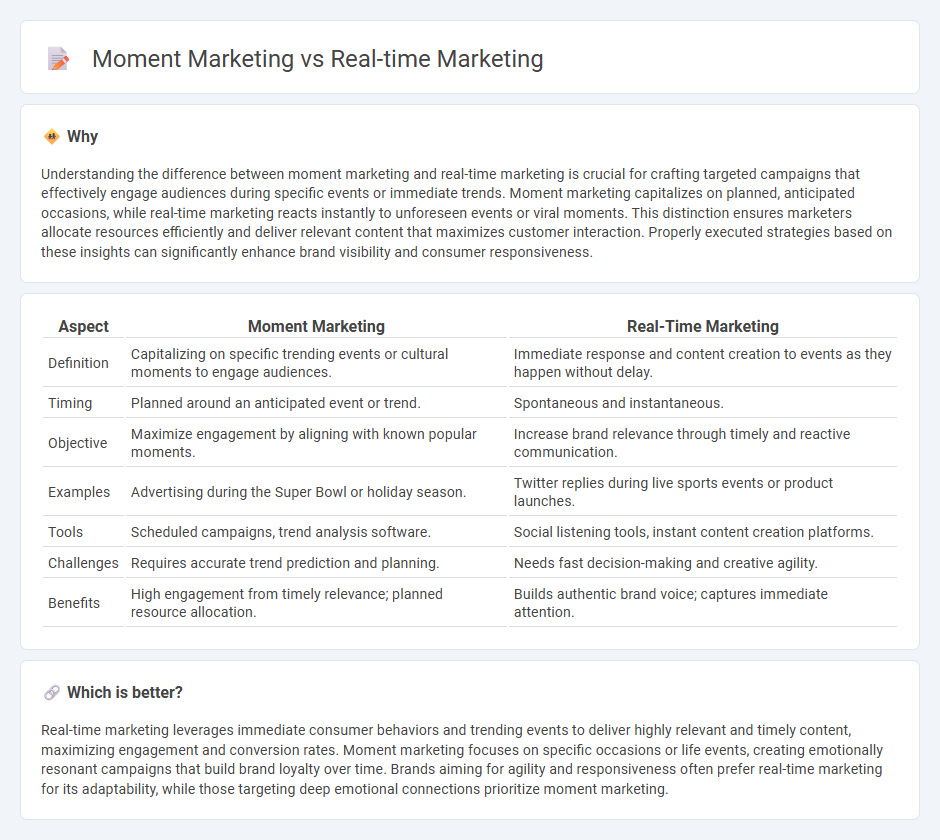
Moment marketing targets specific events or trends to create timely, relevant content that resonates with audiences, leveraging predefined occasions for increased engagement. Real-time marketing requires brands to respond instantly to unexpected events or social media conversations, enabling dynamic interaction and spontaneity. Discover how these strategies can elevate your marketing effectiveness by exploring their key differences and applications.
Why it is important
Understanding the difference between moment marketing and real-time marketing is crucial for crafting targeted campaigns that effectively engage audiences during specific events or immediate trends. Moment marketing capitalizes on planned, anticipated occasions, while real-time marketing reacts instantly to unforeseen events or viral moments. This distinction ensures marketers allocate resources efficiently and deliver relevant content that maximizes customer interaction. Properly executed strategies based on these insights can significantly enhance brand visibility and consumer responsiveness.
Comparison Table
| Aspect | Moment Marketing | Real-Time Marketing |
|---|---|---|
| Definition | Capitalizing on specific trending events or cultural moments to engage audiences. | Immediate response and content creation to events as they happen without delay. |
| Timing | Planned around an anticipated event or trend. | Spontaneous and instantaneous. |
| Objective | Maximize engagement by aligning with known popular moments. | Increase brand relevance through timely and reactive communication. |
| Examples | Advertising during the Super Bowl or holiday season. | Twitter replies during live sports events or product launches. |
| Tools | Scheduled campaigns, trend analysis software. | Social listening tools, instant content creation platforms. |
| Challenges | Requires accurate trend prediction and planning. | Needs fast decision-making and creative agility. |
| Benefits | High engagement from timely relevance; planned resource allocation. | Builds authentic brand voice; captures immediate attention. |
Which is better?
Real-time marketing leverages immediate consumer behaviors and trending events to deliver highly relevant and timely content, maximizing engagement and conversion rates. Moment marketing focuses on specific occasions or life events, creating emotionally resonant campaigns that build brand loyalty over time. Brands aiming for agility and responsiveness often prefer real-time marketing for its adaptability, while those targeting deep emotional connections prioritize moment marketing.
Connection
Moment marketing and real-time marketing both leverage immediate consumer behaviors and events to deliver timely, relevant content that enhances brand engagement. By analyzing current trends and live data, marketers craft personalized messages that resonate during specific moments, driving higher conversion rates. The synergy between these strategies maximizes brand visibility and responsiveness in fast-paced digital environments.
Key Terms
Timeliness
Real-time marketing capitalizes on immediate events as they unfold, aligning brand messaging closely with current trends to maximize audience engagement and relevance. Moment marketing targets specific, significant occasions or experiences, tailoring content to capitalize on emotional connections tied to those moments, such as holidays or major sports events. Explore the nuances and strategic applications of these dynamic marketing approaches to enhance your brand's timeliness and impact.
Context
Real-time marketing leverages current events and immediate consumer behavior to deliver timely, relevant messages that resonate instantly with audiences. Moment marketing zeroes in on specific, culturally significant occurrences or trends to create highly contextual campaigns that engage users emotionally and socially. Explore the nuances between these strategies to optimize your brand's impact in dynamic market environments.
Personalization
Real-time marketing leverages live data and immediate consumer behavior to deliver highly personalized content that resonates with the target audience at the precise moment of engagement. Moment marketing, by contrast, capitalizes on trending events and cultural moments to create relevant, contextualized messages that drive emotional connection and brand relevance. Explore how integrating both strategies can enhance personalized customer experiences and optimize marketing impact.
Source and External Links
How Leading Brands Leverage Real-Time Marketing Successfully - Real-time marketing is about quickly reacting to audience needs and current events to deploy timely campaigns that increase visibility, engagement, and sales.
Real-Time Marketing Strategies (With Benefits) - This strategy connects brands with audiences during trending moments, improving engagement, relevance, and creating a sense of urgency through varied, timely content.
Real Time Marketing | Sprout Social - Real-time marketing engages customers instantly based on breaking news or trends, requiring a plan that identifies triggers, audiences, methods, and desired outcomes to stay relevant and impactful.
 dowidth.com
dowidth.com